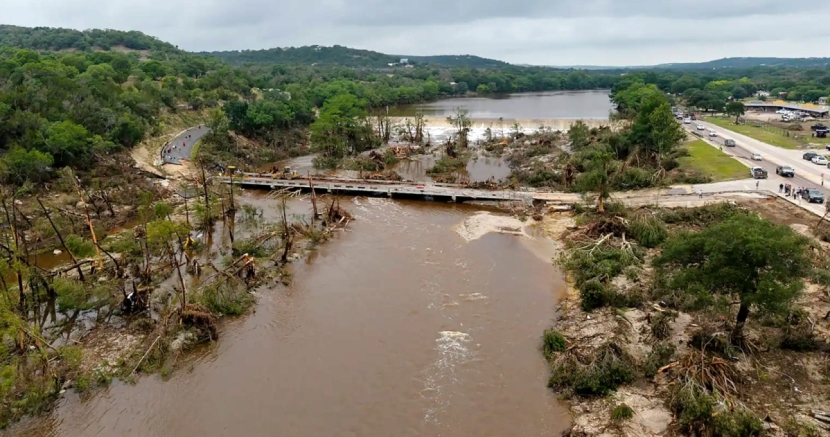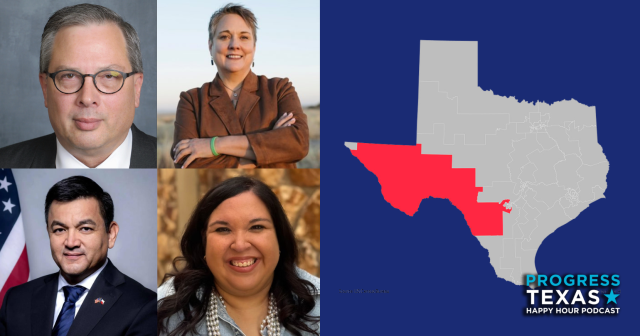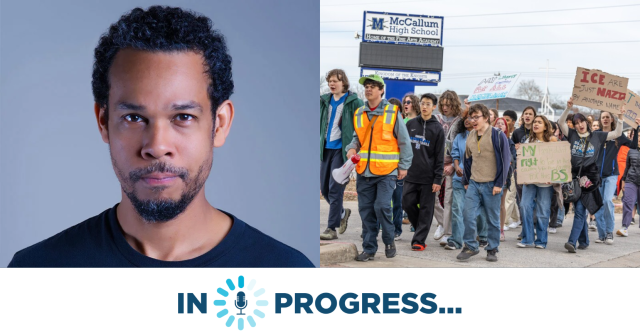Texas Flood Death Toll A Result Of Long Term Infrastructure And Policy Failures

This is a transcription of the Daily Dispatch from July 7, 2025, hosted by Chris Mosser.
The Daily Dispatch, hosted by Chris Mosser on Progress Texas Podcasts network, is posted every weekday, M-F, and takes less than ten minutes to catch up on the news you need to know. Listen below.
If you’re like me, what should have been a celebratory—or at least relaxing—4th of July weekend became something closer to a statewide nightmare with dozens of deaths, many of them young children, and many still missing this morning in floods centered in Kerr County, but extending beyond the Hill Country. All of us at Progress Texas have been following with a mix of hope and horror, as a disaster of undeniably historic proportions has played out and continues to play out. We extend our deepest sympathies to the families who have lost loved ones, many of whom again continue a heartbreaking search for those loved ones as of this publish date. Our deep gratitude and admiration for the brave and determined people who also continue the hopeful search for survivors, both Texans and people who have traveled from out of state in a huge moment of need—our hats are off, and we wish everyone involved in that effort safety and strength in a very hazardous situation.
Search and rescue team members in Comfort, Texas. Eric Vryn via Getty Images
Progress Texas is a media organization which advocates for progressive views and priorities—one thing we will not do is attempt to take advantage of tragedy to further a predetermined political goal—nor will we stray from the facts as we understand them. But, we will attempt to contextualize that understanding based on the facts, many of which relate to infrastructure and procedure, which are put in place by parties who have gained control over those factors via our political process. To insist that politics don’t relate to this situation, that it’s too soon to go there, to ask others not to “bring politics into it,” is simply not consistent with the reality in which this terrible situation exists. And that reality, in Texas, is one that as we’ve said has been crafted by three decades of policy and infrastructure decisions made by a state government almost completely under the control of the Republican Party. It’s ridiculous to blame any individual lawmaker or politician for what happened over this holiday weekend in Texas, but it’s equally ridiculous for those lawmakers to now try to deflect attention away from the fact that they crafted key factors in that situation over those last three decades.
Let’s get up to speed here: CNN confirms that as of 12 pm CT, July 7th, the death toll lies at more than 89 confirmed deceased, and ABC News reported that as of 5 am CT on July 7th there are at least 41 others still missing. A federal disaster declaration has been signed and FEMA personnel are now on the ground in Kerr County. President Donald Trump dodged a question from reporters on his previously announced plans to phase out FEMA, as ABC reporters find that internal documents indicate a current shortage of staffing within that agency. Trump is said to be planning a visit to Kerr County on Friday. And lastly, flood watch warnings have continued across a vast expanse of Texas including the entire Texas Hill Country and extending as far as San Angelo, Uvalde, San Antonio, Austin and Killeen, much of which is now saturated, leading to increased risk of additional flooding today.
To the blame game, which got underway early on the July 4th holiday as state and county officials immediately attempted to shift blame to weather forecasters for underestimating the storm. Joe Hernandez at NPR goes back over that well-documented timeline, reminding us that as early as Wednesday, state officials knew there was significant weather inbound and had begun activating state emergency response resources. By 2:35pm on Thursday afternoon, over twelve hours before the event, the National Weather Service at San Antonio had issued a flood watch for a wide area including Kerr County. By nightfall significant rain was falling across the area. The National Weather Service issued a flash flood warning for Kerr and Bandera Counties at 1:14 am on Friday, that includes an emergency alert to mobile phones, almost three hours before that warning was upgraded to a flash flood emergency at 4:03 am, and the Kerr County Sheriff's Office began reporting flooding at low water crossings at 4:35, as the flood wave struck.
One of the first officials to speak up on Friday morning, Judge Rob Kelly, the top-elected official in Kerr County, gave a press conference in which he called his county’s section of the Guadalupe “the most dangerous river valley in the U.S.,” but then insisted that county officials didn’t know this dangerous weather had been possible (NPR.) As Governor Greg Abbott put it in his press conference, “to most people in the area, flash flooding would mean one thing, not what it turned out to be, because they deal with flash floods all the time…there's the potential for flash flooding, but there's no expectation of a water wall of almost thirty feet high.” (NPR.)
What’s lost here, and what has been confirmed by multiple atmospheric science experts, is that the actual degree of rainfall from any storm is always an estimate—that the National Weather Service relayed all the information it had on hand in a timely fashion, but that information was not interpreted by local officials as a dire warning. On the National Weather Service, the question arises, and remains unanswered, as to whether or not current staffing shortages contributed to the situation. Job cuts under the Trump administration at the NWS and its parent organization, the National Oceanic and Atmospheric Administration (NOAA) have resulted in a reduction of 600 positions, which had led to a destabilization of operations which as of last month was being rectified by bringing back some of those weather professionals who had been fired en masse. One of those was Paul Yura, who had worked for the office for 32 years before he was forced into early retirement by these cuts back in April—his job had been as a warning coordination meteorologist at the NWS’s Austin and San Antonio office, the very one with jurisdiction over the Guadalupe River Valley—an experienced veteran of the kind one would want in position at such a drastic moment.
BBC coverage from Jessica Rawnsley notes comments from Nim Kidd, chief of the Texas Division of Emergency Management at Governor Abbott’s press conference, on how cell phone coverage in the affected area was lacking to non-existent. In a moment when so much emergency information is tied to our phones, that is a communications infrastructure failure. Kerrville City Manager Dalton Rice notes that he thinks the public has become desensitized by too many weather warnings, and that’s an indication of a long term procedural failure.
A New York Times report says that eight years ago, Kerr County had considered setting up a flood warning system along the river, similar to a tornado warning siren, but it was never implemented in “the most dangerous river valley in the country” due to cost. So, instead of an automated system in which flood gauges would activate sirens downriver from rising waters, Kerr County locals along the river continued to rely on a loose word of mouth system—that’s an obvious situation where budgets were prioritized over public safety.
Still, Texas counties have only so much money, and you’d think that the state might pitch in for something so important—something that almost happened in the most recent legislative session. Terri Langford and Carlos Nogueras Ramoshe at the Texas Tribune write that freshman Republican House Rep. Wes Virdell from Brady, who represents Kerrville at the Capitol—and was all over CNN yesterday talking about how nothing could have been done to prevent this tragedy—himself just weeks ago voted against House Bill 13, a bill would have established a statewide plan “to improve Texas’ disaster response, including better alert systems, along with a grant program for counties to buy new emergency communication equipment and build new infrastructure,” specifically including automated emergency outdoor warning systems. HB 13 passed the House overwhelmingly, with only 14 votes against including Virdell’s, but it ultimately died in the Senate.
This law would not have changed things this weekend. Still, it’s an indicator of how our state government—focused on the Ten Commandments in classrooms, and subsidies for wealthy families to attend private schools, and picking on the vanishingly small minority of trans Texans, and continually attacking reproductive freedom, and banning THC—can let a pretty basic safety infrastructure initiative fade into the background and off the table, even after garnering massive support in the lower chamber. That is a complete failure of leadership, and our leadership in Texas is Republican. That’s not spin, that’s facts. Representative Wes Virdell tells the Trib “I can tell you in hindsight, watching what it takes to deal with a disaster like this, my vote would probably be different now.” How very convenient.
We don’t have time to get far into the fact that these extreme weather events—with months of rainfall falling in minutes—are directly tied to human-influenced climate change, another problem that Republicans ignore at best and deny at worst. Madalyn Mendoza, Astrid Galván, and Ben Geman at Axios collected quotes from a variety of climate experts, including Andrew Dessler, director of the Texas Center for Extreme Weather at Texas A&M, who says the floods of this weekend are quote "Exactly what the future is going to hold," noting that Kerr County was unprepared, and that other local governments had better take heed. UC-Davis Earth and Planetary Sciences Professor Nicholas Pinter says climate change as it applies to weather modeling "is shifting those probabilities—sometimes bringing us floods that are more severe and more frequent than in the past." UCLA climate scientist Daniel Swain says this “kind of record-shattering rain event is *precisely* that which is increasing the fastest in warming climate,” referring specifically to slow-moving torrential thunderstorms.
As far as the politics of this situation go: politics lead to policy, and bad policy leads to tragedy. One guy who took it on the head for going there this weekend was longtime beloved local Austin meteorologist Jim Spencer, a giant in his field, who wrote on his Facebook page about the backlash he got for laying out facts in a similar way to how we have this morning.
Spencer wrote, “to those accusing me of “politicizing a tragedy,”...There is nothing political about asking hard questions when more than 70 lives have been lost. Holding public officials accountable isn’t partisanship. It’s journalism. If seeking the truth is now considered “political,” that says more about our broken discourse than it does about me. This is news. It’s unfolding now. Parents are grieving now. People are looking for answers now. If I were the parent of one of those missing children, I would demand those answers immediately. Silence doesn’t honor the dead—it protects the status quo. I’m shaken by this whole thing, and if anything I’ve said came off as harsh, I’m sorry. But I won’t apologize for doing what journalists are supposed to do: shine a light when others would rather look away.”
Absolutely agree. You’ll note that generally, folks who say “it’s too soon” or outside the realm of politics when avoidable tragedy strikes, tend to be those in power—and those who must now account for their own votes. As the next election approaches, let’s vote for better.
Once again, our deepest condolences to the untold number of Texans who have lost someone they love over this horrible weekend, and our praise and thanks to all who are working so hard in the many areas of Texas impacted by the floods. Please be safe everyone.
Campers near the North fork of the Guadalupe River, are reconnected with their families after heavy rainfall in Central Texas. Jason Fochtman via Houston Chronicle/Hearst Newspapers
If you’re in a position to help financially (from anywhere in Texas and beyond), please consider the Hill Country Flood fundraiser from Texas Ag Commissioner candidate Clayton Tucker.
100% of funds generated will go towards urgently needed supplies and/or be given directly to charities helping the flood victims in Kerr County and elsewhere in the Texas Hill Country.
DONATE
Your donation supports our media and helps us keep it free of ads and paywalls.








